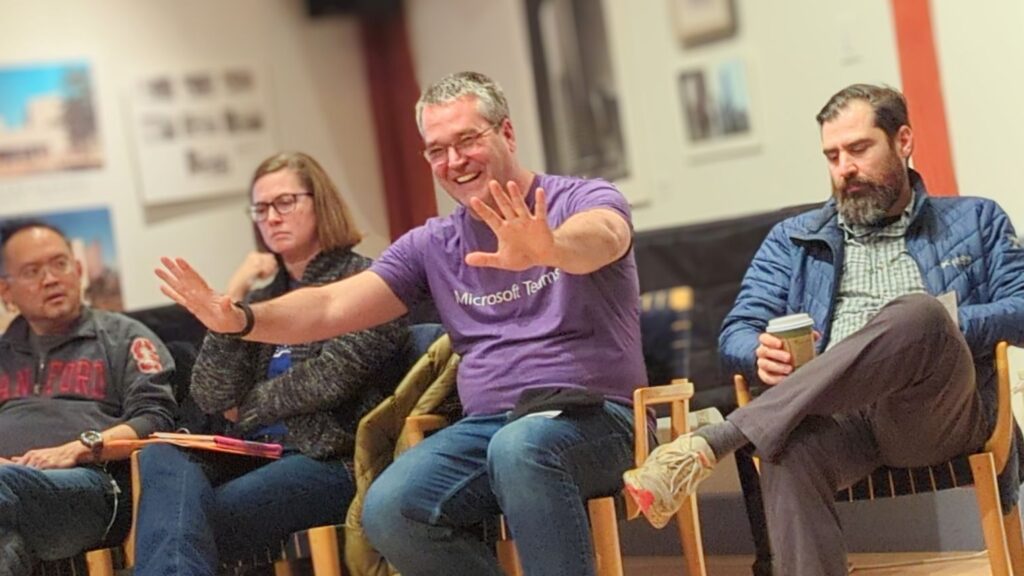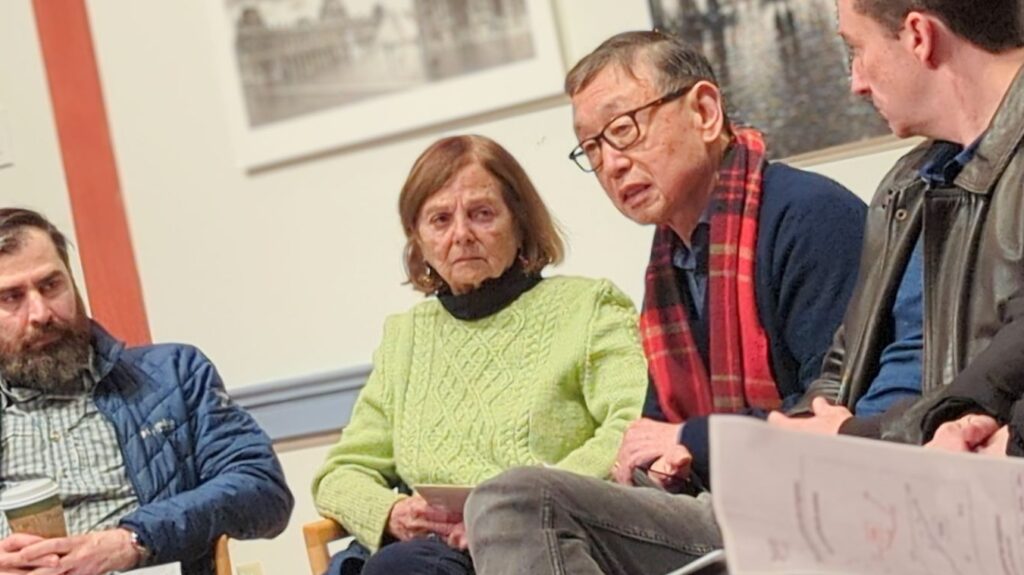SCchair2
School Committe President Chris Breszki, shown here with city councilors Pam Wright, Julia Malakie and Andrea Kelley, speaks with parents and teachers at the Scandinavian Center.
As the seemingly endless contract negotiation makes its way into a new year, some School Committee and City Council members are trying to bridge the chasm of miscommunication among teachers, district officials and parents.
On Sunday, parents of Horace Mann students organized a meeting with Ward 3 councilors Pam Wright, Julia Malakie and Andrea Kelley at the Scandinavian Living Center in West Newton.
“Many of us have questions, I think,” organizer and parent Alli Franke said as people walked into the facility’s Nordic Hall meeting room. “Certainly I have some questions about money in Newton, how to free it up.”
Word had spread about the meeting, and by Sunday’s gathering others joined—including parents from other schools, other School Committee members and city councilors, and Ward 2 Councilor David Micley in a tuxedo (headed to wedding afterward)—in what proved to be a very productive conversation.
“There haven’t been opportunities like this for questions to be asked and answered from multiple perspectives,” Councilor Kelley said.
Here are some takeaways from Sunday’s discussion:
So, about that pile of cash…
The first question was about the city’s free cash.
“There’s been talk about millions of dollars sitting under the mayor’s desk that’s free cash,” one Newton father asked. “Is it still there?”
While obviously there really isn’t a pile of cash under the mayor’s desk—imagine the work distractions that would involve—there is a lot of money in the city’s free cash account.
“Free cash” refers to money left over after each year that’s put into an account and certified by the state. A typical year brings between $10 million and $15 million in free cash.
“Usually, even on a good year free cash would be $20 million,” Councilor Susan Albright said.
This year, there’s about $56 million.

So where did that windfall come from? Largely, Eversource. In 2022, the utility company challenged property taxes it owed to the city for the previous 13 years. A few months ago, Eversource dropped the challenge for most of those years, freeing up $26 million that had been set aside for Eversource’s appeal.
Mayor Ruthanne Fuller also announced last year that more than $20 million in an abatement account—money the city sets aside to offset potential tax abatements and other property tax exemptions—had gone unused and was now available. Combined with the Eversource money, the mayor’s announcement noted, the city had an extra $46 million in surplus funds.
Around $12 million of that has been set aside for public facilities improvements, including work on the Mason Rice building, Albright said.
The city and Eversource are still in court disputing the company’s tax liability, and depending on how it turns out, Eversource could be paying the city more money going forward than it had in years past.
Stabilization funds vs. destabilized schools
Mayor Fuller proposed setting the surplus aside in a stabilization fund, but the City Council rejected that plan.
“I voted against it because I didn’t think it was enough,” Councilor Kelley said. “It wasn’t enough, it wasn’t soon enough, it wasn’t giving the public schools enough, and I thought if we say ‘yes’ to this then she’s not going to be forced to go back to the table and negotiate for more sooner and more overall.”
The split override votes of last spring—in which voters approved tax levy overrides to pay for Countryside School and Franklin School renovations but rejected a $9.2 million override for the general budget, which would have paid for improvements to the Horrace Mann School—affected the budget and what could be paid for now, Kelley said.
“This all started because we didn’t pass the override, the operational override,” Kelley added. “I know those of you who are Franklin parents are probably happy Franklin and Countryside got covered, and those of you who are Horace Mann parents are understandably unhappy, and that’s what started to sort of lead to these plans.”
The mayor’s proposed stabilization account would have provided money to Newton public schools in incremental amounts over the next eight years, in addition to the school department’s regular annual funding, until the city gets a bunch of money related to pensions in 2032, School Committee Chair Chris Breszki, who was at Sunday’s meeting, explained.
Wait… What’s coming in 2032?
State law mandate that all cities and towns have their pension funds paid in full by 2040, and Newton is set to reach that goal in 2032 (the goal was originally 2030, but City Hall pay adjustments were made in April that extended pension fund completion by two years).
Each year, the city pays a lot of money into its pension fund—in FY2022 alone it was nearly $48 million—and when that fund is paid up in 2032, the money typically set aside for the pension fund will be available for the city to use elsewhere.
“Because 2032 is that magical day when our pension is funded,” Breszki said. “So the amount we’re funding into our pension on an annual basis, relative to the amount that will then be funded for OPEB [the Other Post-Employment Benefits account] following that, is going to be probably something like a $25 million windfall to the city budget starting that year.”
Once that benchmark is reached, it will be easier to fund the schools, he predicted.
“The problem is that was going to put, like, $600,000 or something [from the surplus, incrementally] in excess funds to NPS next year, but $600”,000 does not move the needle when it comes to the needs we have as an organization,” Breszki continued.
Those needs have been exacerbated by cuts the School Committee has made in recent years, at a time when kids have suffered learning loss and emotional upheaval from the COVID-19 pandemic.
“And those cuts have been made because we didn’t have the funds to provide the services that we believed we needed to provide,” Breszki said. “I don’t want to go through that anymore. I think that is the most destabilizing thing for an organization—that uncertainty, what’s going to happen, whose department’s going to get cut, what programs are going to be cut—to me, that uncertainty is the morale-killer in any organization, whether it’s a school district or a company or whatever.”
The ‘S’ word
Morale was a big theme in Sunday’s gathering. Teachers talked about feeling frustrated, exhausted, defeated while they try to educate the city’s children in the midst of a post-pandemic learning crisis.
One teacher on Sunday said she’s had residents yell at her to find a new job if she doesn’t like her pay. Another teacher talked about having to do the job of multiple staff members to control rooms full of kids and the amount of time that takes away from his teaching.

The Newton Teachers Association has turned that frustration into a battle cry and a rallying call, demanding the mayor put more money toward the schools and teacher pay now.
“We set a couple more dates of negotiating, and we want to get back to the table and resolve this, face-to-face where we can compromise and find places where we can come to agreement and tweak things,” Sue Cohen, NTA recording secretary, said.
Unlike past negotiations, however, this one has involved different items packaged together, making compromise more difficult, Cohen said.
“Any proposal that they make that we feel is good for the students, good for the staff and would move us forward in teaching and learning, we have to take everything in that package,” Cohen said.
And a package can have five items teachers want and three they don’t want, which would seem like a win for teachers. But if the three items they don’t want are problematic enough, they outweigh gains made by teachers in that package.
On Tuesday, the School Committee announced they had asked the state to investigate a teacher strike and said they had evidence the NTA would be holding a strike vote this week.
“The outcome and impact of that vote is not known,” the committee wrote in a statement Tuesday. “Teacher strikes are illegal in Massachusetts and would violate our contract. It is our statutory obligation to file a CERB petition if we become aware that an illegal strike action may occur. We also believe it is our responsibility to inform the NPS community if we believe this is a possibility.”
Teachers are not legally allowed to go on strike in Massachusetts, and doing so comes with hefty fines for teacher unions.
NTA President Michael Zilles on Tuesday issued a statement in which he didn’t outright call for a strike vote but also didn’t deny that a strike vote was coming on Thursday.
“Mayor Fuller and the School Committee have made no meaningful attempts to settle a fair contract with the Newton Teachers Association,” the statement begins. “For two years now the NTA has been adamant about the need for Fuller to better fund Newton Public Schools. Staff and programs have been cut, student mental health needs are going unmet and those tasked with making sure our most vulnerable students are receiving an appropriate education are not earning close to a living wage.”
Where we are now
Breszki said he and Superintendent Anna Nolin went to the mayor with a proposal to get the schools more money now instead of waiting eight years, to at least address three things: large class sizes at the high schools, a lack of support staff at the elementary schools and teacher pay.
“We didn’t get everything we wanted,” Breszki said, adding he thought the mayor’s plan was “reasonable,” given the amount of money in the city budget and what needed to be done.
“We want to do things that matter where we will see real impacts for kids now,” he said. “So having 25 kids in that high school math class instead of 32? That’s going to be a real impact for those kids. Having the proper supports for the five elementary schools that need it the most? That’s going to have a real impact. Increasing our offer to the NTA? We believe it is at a competitive level.
“I know the NTA leadership would like to see it [pay] more competitive, but this is how we allocated the money to make the differences that we wanted to make.”
Breszki said that while he can’t make any commitments for the rest of the School Committee, he’s open to meeting with union leadership any time to talk.
“I’m going to do whatever I can. I promise you,” Breszki told the room.
Parents at Sunday’s meeting wanted to know what more they could do, aside from the emails and letters they’ve been sending Mayor Fuller.
The answer: Show up in person.
City councilors recommended showing up at School Committee meetings, where the mayor would have to walk past them and look at them. They also suggested going to the mayor’s office and demanding answers.
“That physical presence,” Kelley said. “At the mayor’s office, at her office hours, outside as she goes into School Committee meetings the Ed Center.”
If there is a union strike vote coming, that could change the dynamics of this battle entirely.